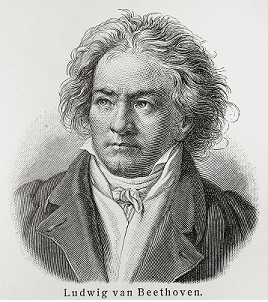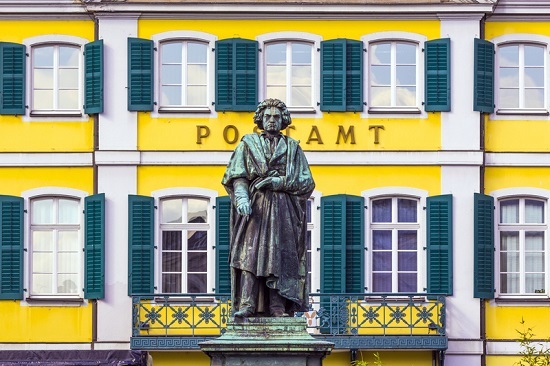

Ludwig van Beethoven was born on December 17, 1770, in Bonn, archbishopric of Cologne, Germany; he is often considered the greatest composer who ever lived. On March 26 March 1827, he passed away in Vienna. When it comes to that period in music, no one can compare to him. While his work is firmly rooted in the Classical traditions of Joseph Haydn and Mozart, it is also influenced by Goethe and Friedrich von Schiller.
In his family, Beethoven was the oldest child to survive to adulthood. His parents were Johann and Maria Magdalena van Beethoven.  They trace their roots back to Malines, in the Flanders province. When Beethoven's grandpa joined the choir of the archbishop-elect of Cologne, he moved the family to Bonn, where he finally became the Kapellmeister.
They trace their roots back to Malines, in the Flanders province. When Beethoven's grandpa joined the choir of the archbishop-elect of Cologne, he moved the family to Bonn, where he finally became the Kapellmeister.
The death of Beethoven's grandfather in 1773 and his father's descent into alcoholism led to a steady decrease in the family's financial status. As the family breadwinner, Beethoven had to stop school at age 11 and start working.
Description-Sketch painting of Ludwig van Beethoven
By 1783, he was hired as the opera's continuo musician in Bonn. By 1787, he had made enough progress that he was sent to Vienna to study with Wolfgang Amadeus Mozart, one of the most well-known and prolific composers of the classical era, by Maximilian Francis, archbishop-elect since 1784. Legend has it that after seeing Beethoven's play, Mozart exclaimed, “this young guy will create a big reputation for himself in the world” because of the composer's admiration for his improvisational skills.
The reception for Beethoven was instantaneous and uncontested. Eventually, he became the most ardent sponsor of all time since the Emperor's younger brother, Archduke Rudolph, picked him to teach piano at 16.
In 1793, Beethoven's variations for piano were published, followed by his official Opus 1 in 1795, a collection of three piano trios dedicated to Prince Lichnowsky.
By 1795, Beethoven was giving public performances as both a composer and a concerto soloist. After performing what was likely the first performance of his Concerto No. 2 in B flat in March, he performed what was maybe the first performance of his Concerto No. 1 in C at a large concert given by Haydn in December.
By 1796, he was already experiencing tinnitus and hearing loss. When he was around 44 or 45 years old, he lost all of his hearing. However, this did not stop him from making new compositions since he had an understanding of how different sounds blended because of his three-decades-long career in music.
It was in 1802 that Beethoven wrote his Piano Sonata No. 14 (titled “Moonlight”). In 1804, Beethoven finished his third symphony, dubbed the “Eroica” for its heroic tone. A new standard for symphonic music was set.
On 2 April 1800, in Vienna's Royal and Imperial Court Theatre (Burgtheater), Beethoven the composer gave his first public performance for his benefit, laying his musical cards on the table with the premiere of his First Symphony.
One of the most well-known musical snippets is the opening motif of Beethoven's Fifth Symphony from 1808. Beethoven's only opera, Fidelio, went through several draughts and changes during his 'middle period,' He also wrote keyboard pieces like the Waldstein and Apassionata sonatas at this time.
Additionally, Beethoven's Ninth Symphony, the “Choral,” from 1824, is another of his works that have endured perpetually. It was the first time choir voices had been employed in a symphony of this magnitude
Beethoven's contribution to the development of the musician and artist is among his most enduring legacies. He is akin to the Old Testament prophets in that he has given his life to his vocation, fought against indifferent public and harsh detractors, and reached the hearts of many via his music. For this reason, he is credited as the progenitor of heroic and romantic music.
Beethoven's deafness is another facet of his romantic hero persona. He's like a Biblical figure in that he was given a tremendous gift—so much insight that God touched his ears—but also a thorn in the flesh (like Paul) to keep the flamboyance and the lust for power in check.

Ludwig van Beethoven Monument
Description-The Beethoven Monument on the Munsterplatz in Bonn, Germany
Beethoven's productivity slowed down at the end of his life due to illness and worsening hearing, but he still managed to write groundbreaking pieces like the radically innovative 'Late Quartets' in 1825. After a protracted illness that has been variably linked to alcohol, hepatitis, cirrhosis, and pneumonia, Beethoven passed away on March 26, 1827, in Vienna.
German composer Ludwig van Beethoven was born in 1770 in a small village called Bonn. Between the Classical and Romantic eras, Beethoven had the most significant impact on Western music. He created some of the most excellent musical compositions in history and even surpassed the greatest composer of the time, Mozart. Even after losing all of his hearing at 45, Beethoven did not stop creating masterpieces.
Q1. Where and when did Beethoven meet Mozart?
Ans. Beethoven met Mozart in Vienna in 1787. He was sent there by archbishop Maximilian Francis.
Q2. Name some of the most famous compositions of Beethoven.
Ans. There are numerous famous compositions by Beethoven, some of which are: Moonlight, Beethoven's 5th Symphony, the Choral, Late Quartets, etc.
Q3. Who mainly influenced the music composed by Beethoven?
Ans. Beethoven’s music was initially influenced by European composers like Wolfgang Amadeus Mozart and Josef Haydn, however, the legendary German musician ultimately developed into his person.